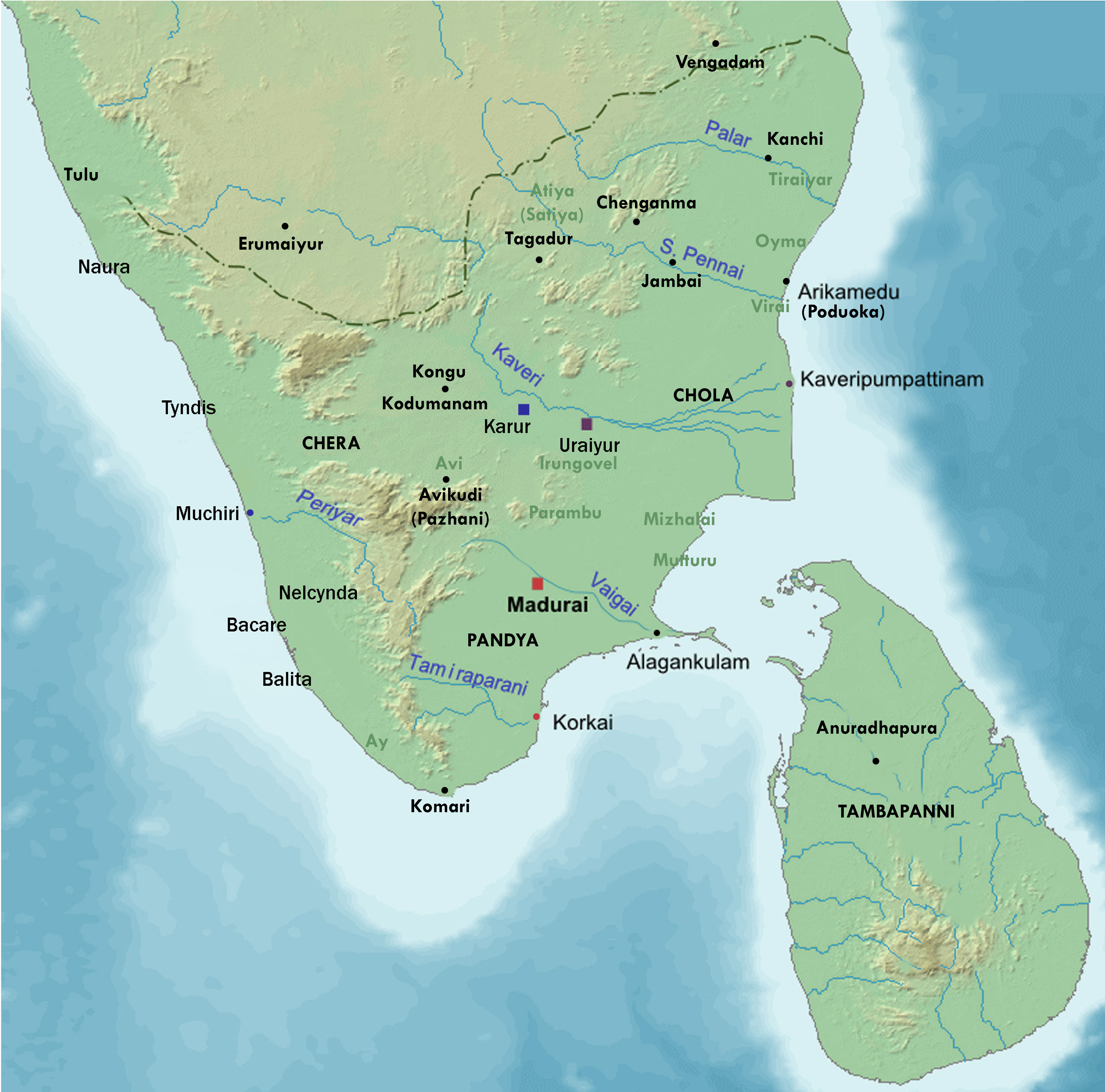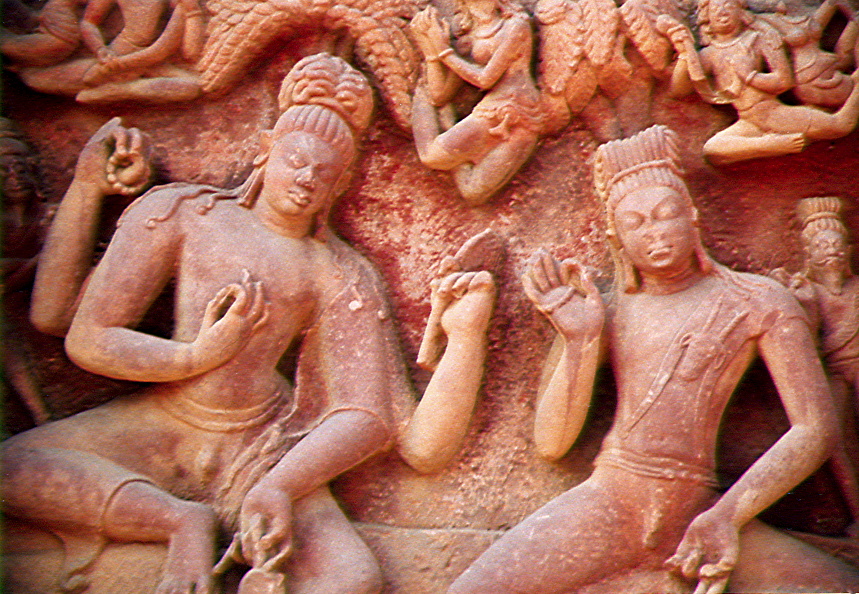|
Madhavi (Silappatikaram)
Madhavi is an important character in the ''Silapathikaram'', one of the epics in Tamil literature. Silapathikaram is the first Kappiyam (epic) among the five in Tamil literature. It belongs to the Sangam Period. Madhavi was born in a lineage of courtesans, and was an accomplished dancer. Madhavi is one of the three main characters in Silappatikaram, along with Kannagi and Kovalan. Plot Madhavi was the daughter of a dancer, Chitrapahti; they were believed to have a long ancestry, starting with the apsara Urvashi. Madhavi was rigorously trained in music, dance and composition of poems. Kovalan, the son of a wealthy merchant and the husband of Kannagi, met Madhavi in a performance in Chozha king Karikalan's court. Enamoured of her beauty, he fell in love with her. Eventually, Kovalan left his wife and moved in with Madhavi, with whom he stayed for a year. Madhavi bore him a daughter Manimekalai. However, after spending all his money on Madhavi, he realised his mistakes and return ... [...More Info...] [...Related Items...] OR: [Wikipedia] [Google] [Baidu] |
Silappatikaram
''Cilappatikāram'' ( ta, சிலப்பதிகாரம் ml, ചിലപ്പതികാരം,IPA: ʧiləppət̪ikɑːrəm, ''lit.'' "the Tale of an Anklet"), also referred to as ''Silappathikaram'' or ''Silappatikaram'', is the earliest Tamil epic. It is a poem of 5,730 lines in almost entirely ''akaval'' (''aciriyam'') meter. The epic is a tragic love story of an ordinary couple, Kannaki and her husband Kovalan. The ''Silappathikaram'' has more ancient roots in the Tamil bardic tradition, as Kannaki and other characters of the story are mentioned or alluded to in the Sangam literature such as in the ''Naṟṟiṇai'' and later texts such as the ''Kovalam Katai''. It is attributed to a prince-turned-monk Iḷaṅkõ Aṭikaḷ, and was probably composed in the 5th or 6th century CE. The ''Silappatikaram'' is set in a flourishing seaport city of the early Chola kingdom. Kannaki and Kovalan are a newly married couple, in love, and living in bliss. Over time, Kova ... [...More Info...] [...Related Items...] OR: [Wikipedia] [Google] [Baidu] |
Manimekalai
''Maṇimēkalai'' ( ta, மணிமேகலை, ), also spelled ''Manimekhalai'' or ''Manimekalai'', is a Tamil-Buddhist epic composed by Kulavāṇikaṉ Seethalai Sataṉar probably around the 6th century. It is an "anti-love story", a sequel to the "love story" in the earliest Tamil epic ''Silappadikaram'', with some characters from it and their next generation. The epic consists of 4,861 lines in ''akaval'' meter, arranged in 30 cantos. The title ''Manimekalai'' is also the name of the daughter of Kovalan and Madhavi, who follows in her mother's footsteps as a dancer and a Buddhist nun. The epic tells her story. Her physical beauty and artistic achievements seduces the Chola prince Udayakumara. He pursues her. She, a nun of Mahayana Buddhism persuasion, feels a commitment to free herself from human ties. She rejects his advances, yet finds herself drawn to him. She hides, prays and seeks the help of her mother, her Buddhist teacher Aravana Adikal and angels. They teach ... [...More Info...] [...Related Items...] OR: [Wikipedia] [Google] [Baidu] |
Buddhist
Buddhism ( , ), also known as Buddha Dharma and Dharmavinaya (), is an Indian religion or philosophical tradition based on teachings attributed to the Buddha. It originated in northern India as a -movement in the 5th century BCE, and gradually spread throughout much of Asia via the Silk Road. It is the world's fourth-largest religion, with over 520 million followers (Buddhists) who comprise seven percent of the global population. The Buddha taught the Middle Way, a path of spiritual development that avoids both extreme asceticism and hedonism. It aims at liberation from clinging and craving to things which are impermanent (), incapable of satisfying ('), and without a lasting essence (), ending the cycle of death and rebirth (). A summary of this path is expressed in the Noble Eightfold Path, a training of the mind with observance of Buddhist ethics and meditation. Other widely observed practices include: monasticism; " taking refuge" in the Buddha, the , and th ... [...More Info...] [...Related Items...] OR: [Wikipedia] [Google] [Baidu] |
Neduncheziyan
Nedunjcheliyan I ( c. 270 BCE) (Tamil: நெடுஞ்செழியன்) was a Pandya king.He was also known as Arya Padai kadantha Nedunjezhiya Pandiyan Archaeological evidence His name is present in the Mangulam inscriptions of 3rd century BCE. The inscriptions mentions that workers of ''Nedunchezhiyan I'', a Pandyan king of Sangam period, (c. 270 BCE) made stone beds for Jain monks. In popular culture Nedunjeliyan I was also the Pandya king of the epic ''Silappatikaram'' authored by the Sangam poet Ilango Adigal who later died of a broken heart along with his queen consort Kopperundevi. He is portrayed by O. A. K. Thevar in the film Poompuhar (1964). See also * List of Sangam poets Sangam refers to the assembly of the highly learned people of the ancient Tamil land, with the primary aim of advancing the literature. There were historically three Sangams. With the details of the first two Sangams remaining obscure, all the ... Notes References * ... [...More Info...] [...Related Items...] OR: [Wikipedia] [Google] [Baidu] |
Madurai
Madurai ( , also , ) is a major city in the Indian state of Tamil Nadu. It is the cultural capital of Tamil Nadu and the administrative headquarters of Madurai District. As of the 2011 census, it was the third largest Urban agglomeration in Tamil Nadu after Chennai and Coimbatore and the 44th most populated city in India. Located on the banks of River Vaigai, Madurai has been a major settlement for two millennia and has a documented history of more than 2500 years. It is often referred to as "Thoonga Nagaram", meaning "the city that never sleeps". Madurai is closely associated with the Tamil language. The third Tamil Sangam, a major congregation of Tamil scholars said to have been held in the city. The recorded history of the city goes back to the 3rd century BCE, being mentioned by Megasthenes, the Greek ambassador to the Maurya empire, and Kautilya, a minister of the Mauryan emperor Chandragupta Maurya. Signs of human settlements and Roman trade links dating back to 3 ... [...More Info...] [...Related Items...] OR: [Wikipedia] [Google] [Baidu] |
Sattanar
Satthanar or Chithalai Satthanar ( ta, சாத்தனார் or சீத்தலைச் சாத்தனார், ''cītalai cāttanār'') was the Tamil poet who composed the epic Manimekalai. A total of 11 verses of the Sangam literature have been attributed to Satthanar, including verse 10 of the Tiruvalluva Maalai. Etymology Pronounced ''Sa-tha-naar,'' the name is derived from ( ta, சாத்து, ''sāttu'') meaning Buddhist monk. Applying this principle to the name Maturai Kulavāṇikan Cāttan, the author of Manimekalai, we see that the two appellations Maturai and Kulavanikan were prefixed to his name in order to distinguish him from another poet of Maturai with the same name and from a third who lived elsewhere. Several examples could be cited of this system of nomenclature which prevailed during the early days. Biography Satthanar hailed from a place known as Seerthandalai, later came to be known as Seethalai. He was a grain merchant at Madurai and h ... [...More Info...] [...Related Items...] OR: [Wikipedia] [Google] [Baidu] |
Indra
Indra (; Sanskrit: इन्द्र) is the king of the devas (god-like deities) and Svarga (heaven) in Hindu mythology. He is associated with the sky, lightning, weather, thunder, storms, rains, river flows, and war. volumes/ref> Indra's myths and powers are similar to other Indo-European deities such as Jupiter, Perun, Perkūnas, Zalmoxis, Taranis, Zeus, and Thor, part of the greater Proto-Indo-European mythology. Indra is the most referred deity in the ''Rigveda''. He is celebrated for his powers, and as the one who killed the great evil (a malevolent type of asura) named Vritra, who obstructed human prosperity and happiness. Indra destroys Vritra and his "deceiving forces", and thereby brings rains and sunshine as the saviour of mankind. He is also an important deity worshipped by the Kalash people, indicating his prominence in ancient Hinduism. Indra's significance diminishes in the post-Vedic Indian literature, but he still plays an important role in various m ... [...More Info...] [...Related Items...] OR: [Wikipedia] [Google] [Baidu] |
Karikala Chola
Karikala ( ta, கரிகால சோழன்) was a Tamils, Tamil Chola dynasty, Chola Emperor who ruled southern India. He is credited with the construction of the flood banks of the Kaveri, river Kaveri. He is recognised as the greatest of the Early Cholas. Sources The story of Karikala is mixed with legend and anecdotal information gleaned from Sangam literature. The only sources available are the numerous mentions in Sangam poetry. The period covered by the extant literature of the Sangam is unfortunately not easy to determine with any measure of certainty. ''Paṭṭiṉappālai'', ''Poruṇarāṟṟuppaṭai'' and a number of individual poems in the ''Akanaṉūṟu'' and ''Purananuru'' have been the main source for the information that is attributed to Karikala. No authentic records of Karikala's reign have been found so far. However many rulers and petty chiefs who came after him claimed him as their ancestor and decorated themselves as belonging to the ''Cho ... [...More Info...] [...Related Items...] OR: [Wikipedia] [Google] [Baidu] |
Epic Poetry
An epic poem, or simply an epic, is a lengthy narrative poem typically about the extraordinary deeds of extraordinary characters who, in dealings with gods or other superhuman forces, gave shape to the mortal universe for their descendants. Etymology The English word ''epic'' comes from Latin ''epicus'', which itself comes from the Ancient Greek adjective (''epikos''), from (''epos''), "word, story, poem." In ancient Greek, 'epic' could refer to all poetry in dactylic hexameter (''epea''), which included not only Homer but also the wisdom poetry of Hesiod, the utterances of the Delphic oracle, and the strange theological verses attributed to Orpheus. Later tradition, however, has restricted the term 'epic' to ''heroic epic'', as described in this article. Overview Originating before the invention of writing, primary epics, such as those of Homer, were composed by bards who used complex rhetorical and metrical schemes by which they could memorize the epic as received i ... [...More Info...] [...Related Items...] OR: [Wikipedia] [Google] [Baidu] |
Urvashi
Urvashi ( sa, उर्वशी, Urvaśī}) is the most prominent apsara (celestial nymph) in Hindu mythology, considered to be the most beautiful of all the apsaras, and an expert dancer. She is mentioned in both ''Vedic'' and ''Puranic'' scriptures and is often portrayed as a ' swan maiden'. Urvashi is described to be born out of the thigh of sage Narayana and occupies a special place in the court of Indra, the king of the gods and ruler of svarga (heaven). She is famous for her marriage to Pururavas, a mortal king, whom she later abandons. Urvashi is also regarded as the mother of Vedic sages Vashishtha and Agastya. Etymology The Sanskrit name ''"Urvaśī"'' can have multiple meanings. It is derived from roots''uru'' and ''aś''. Some believe that the name has a non- Aryan origin. According to the scripture ''Devi Bhagavata Purana'', the apsara is known as Urvashi because she is born from the ''uru''—'thigh'—of the divine-sage Narayana. Indologist Monier Monier-Wi ... [...More Info...] [...Related Items...] OR: [Wikipedia] [Google] [Baidu] |
Kovalan
Kovalan ( ta, கோவலன்) is a central character in Ilango Adigal's ''Silappatikaram,'' one of the ancient Tamil epics. Family Father : Machattuvan Wife : Kannagi Lover : Madhavi Daughter : Manimekalai (Mother: Madhavi) Narrative Puharkkandam Kovalan, the son of a wealthy merchant, Machattuvan, married Kannagi, the daughter of another merchant, Manayakan. At the time of his marriage, he was sixteen years old. They lived together happily in the city of Kaveripattinam, until Kovalan met the courtesan Madhavi and fell in love with her. In his infatuation, he completely forgot his wife and spent his time and parental wealth with Madhavi. During the annual festival in the honour of Indra, there was a misunderstanding between Kovalan and Madhavi. As a result, the penniless Kovalan returned to Kannagi, who welcomed him whole-heartedly. Realising his mistake, he decided to start a new life by migrating to Madurai with Kannagi. Accompanied by a Buddhist nun, they starte ... [...More Info...] [...Related Items...] OR: [Wikipedia] [Google] [Baidu] |


.jpg)

